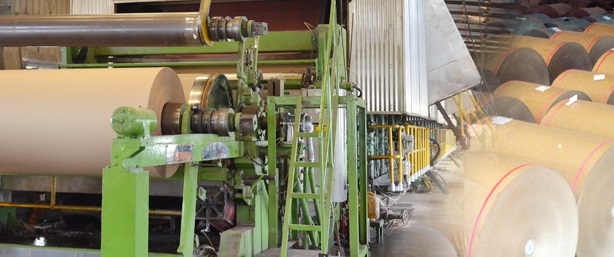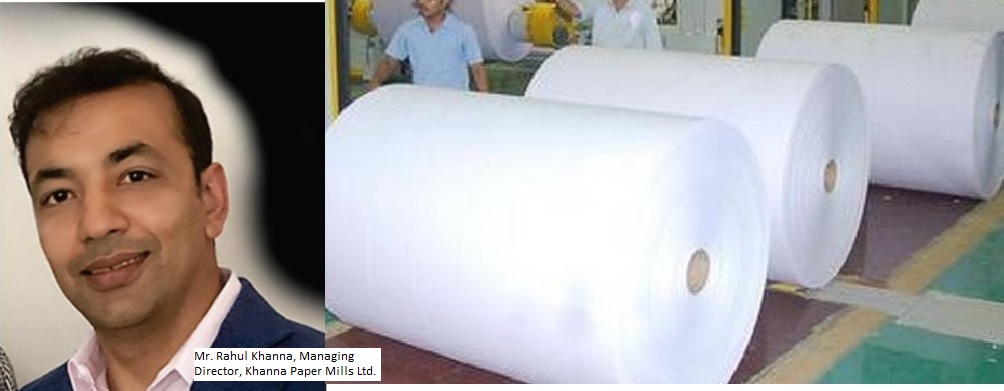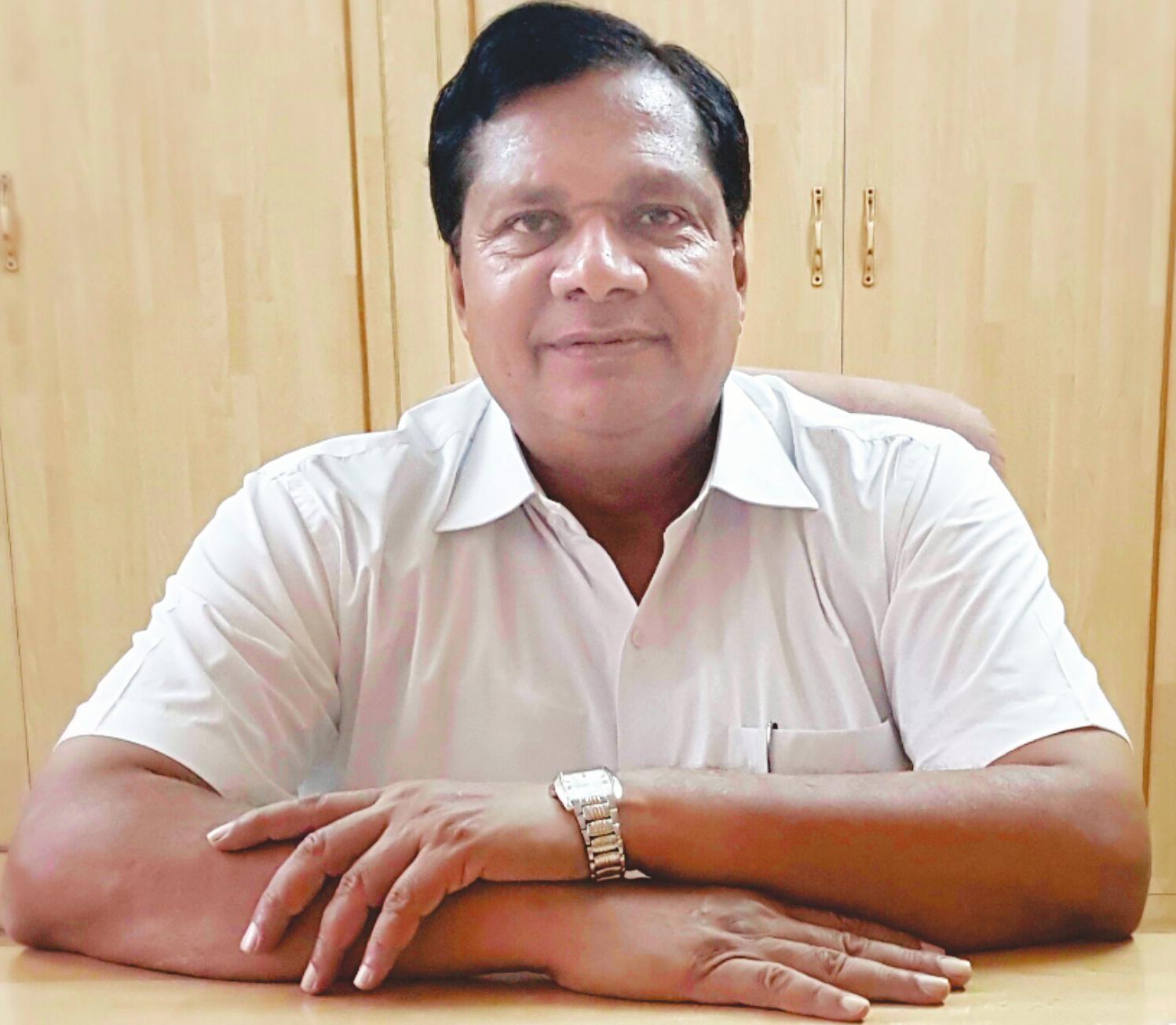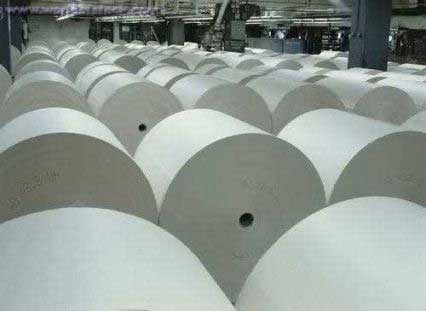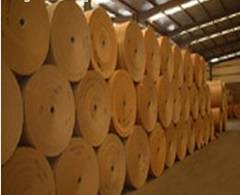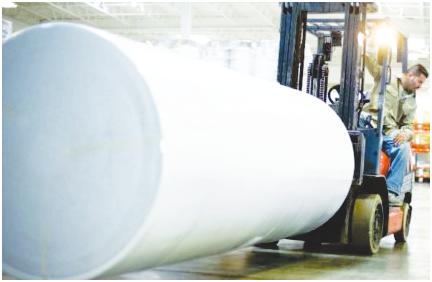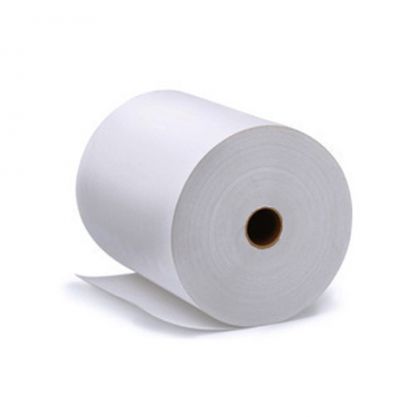Rapid rise: Molded Fiber Solutions gain momentum across North America, Europe, and Asia-Pacific markets, says Madhure Desarda, Director- Operations, Parason Global
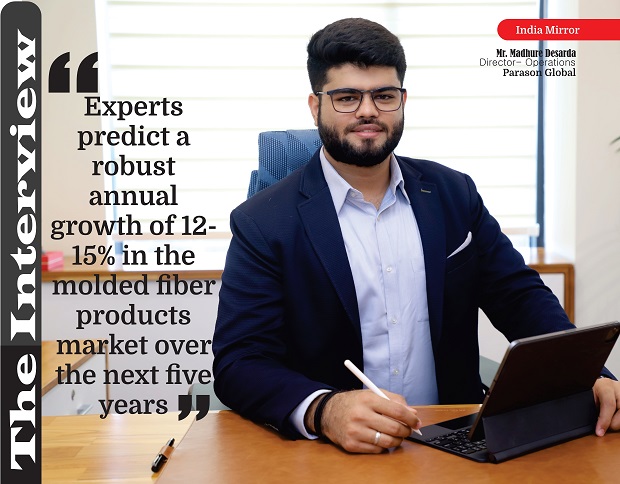
Rapid rise: Molded Fiber Solutions gain momentum across North America, Europe, and Asia-Pacific markets, says Madhure Desarda, Director- Operations, Parason Global
“We've witnessed a growing interest and adoption of our molded fiber solutions both within India and internationally”
“We provide end-to-end solutions, right from engineering design to layout and ISO detailing”
Parason Machinery stands as a distinguished manufacturer and supplier of pulp and paper-making machinery, has proactively engineered comprehensive solutions for molded fiber production. Molded fiber, an eco-friendly and biodegradable material. Parason Machinery's research and development endeavours extend to enhancing the quality and efficiency of molded fiber production. An exclusive Interview of Mr. Madhure Desarda, Director- Operations, Parason Global over the molded fiber product market in India in the shadow of single-use plastic ban. Here are his views:
Q. Please give a small introduction of Parason Machinery and its ‘Molded Fiber Products’ business line
Parason Machinery stands as a distinguished manufacturer and supplier of pulp and paper-making machinery, serving a vast clientele of Kraft, Tissue, Writing, and Hard Board paper mills both in India and across the globe. The company's journey was pioneered by Dr. Champalaji Desarda, a metallurgist with a doctorate from BRNO University.
The success of Parason are encapsulated in its core values represented by the acronym
P – Passionate about Customer Satisfaction
A – Aim High & Achieve High
R – Respect for all Stakeholders
A – Analytical Thinking
S – Safety of entire value chain
O – Ownership approach
N – National Pride
Parason Machinery offers an extensive range of machinery for the pulp and paper industry, covering crucial aspects such as pulping, pulp thickening, cleaning, screening, and dispersion systems. Noteworthy among their innovations is the Maxi Shoe Press, a paper-making machine that substantially reduces steam consumption and enhances paper profiles.
Parason has proactively engineered comprehensive solutions for molded fiber production. Molded fiber, an eco-friendly and biodegradable material. Parason Machinery's research and development endeavours extend to enhancing the quality and efficiency of molded fiber production. The company's well-equipped R&D facilities and a comprehensive database enable the continual design of new products, meeting market demands while prioritizing sustainability.
Q. What is Molded Fiber Technology? Why are Molded Fiber Products considered as the future disposable tableware?
Certainly. Molded Fiber Technology is an innovative process that takes recycled paper, cardboard, and natural fibers and transforms them into versatile molded fiber products. This involves breaking down these materials into a pulp, which is then molded into various shapes using specialized molds and pressing techniques.
As for why Molded Fiber Products are hailed as the future of disposable tableware. These products are biodegradable and compostable, ensuring they naturally break down after use, leaving minimal impact on the environment.
Molded Fibre products exhibit excellent strength and durability, making them a practical alternative to traditional plastics and Styrofoam-based tableware. They can effectively handle both hot and cold items. Molded Fiber Products are poised to lead the way in sustainable tableware solutions, offering a combination of environmental responsibility and performance excellence.
Q. As the Indian government banned single-use plastic last year what demand for these fiber-molded products do you forecast in the next 5 years? What is the growth rate, and what factors are working behind this growth?
Absolutely! With the Indian government taking a firm stand on single-use plastics last year, the interest in molded fiber products has skyrocketed. It's not just a trend; it's a necessary shift towards sustainability.
The numbers look promising too! Experts predict a robust annual growth of 12-15% in the molded fiber products market over the next five years. It's a clear sign that we're moving in the right direction.
This drive towards molded fiber is not only about complying with regulations. Consumers are increasingly aware of the impact of plastic on our planet. Businesses are also catching on. Many companies are committing to sustainability goals and opting for molded fiber products to showcase their dedication to a greener future.
Q. How does Parason cater to the requirement of molded products? Means what services, machinery, and after-sale support provide to its customers?
Certainly. Parason Machinery takes a comprehensive approach to cater to the requirements of molded products. We provide a complete suite of services, cutting-edge machinery, and robust support to meet the needs of our customers in the molded fiber industry.
In terms of services, we offer tailored design and engineering solutions for molded fiber production plants. This includes automated stock preparation systems, molded fiber forming machines, product edge trimming machines, production molds, and other necessary auxiliaries. We provide end-to-end solutions, right from engineering design to layout and ISO detailing.
Our machinery is at the forefront of molded fiber technology. We manufacture and supply state-of-the-art equipment that is vital for efficient molded fiber production. This includes automated molding machines that optimize the production process, enhance efficiency, and ensure consistent quality in the molded products.
Parason Machinery is dedicated to providing a holistic approach to molded fiber production. We offer top-notch services, advanced machinery, and exceptional after-sale support to assist our customers in producing high-quality molded fiber products efficiently and sustainably. We provide comprehensive training for operating and maintaining the machinery. Our technical experts are readily available to address any queries or issues, ensuring a seamless operation of the equipment
Q. What is the shelf life of the fiber molded box and how does it protect inside food products? Does it require any barrier coating?
Indeed. The shelf life of a fiber-molded box typically ranges from several months to a year, depending on factors such as fiber composition, manufacturing processes, and the application of specific coatings or treatments. These aspects significantly influence the longevity of the molded box.
Fiber-molded boxes offer inherent strengths. Known for their durability and structural integrity, they ensure secure packaging during transit and storage, effectively safeguarding the enclosed food items from damage.
Furthermore, molded fiber possesses excellent insulating properties, aiding in maintaining appropriate temperatures for the packaged contents. This aspect is particularly significant for perishable food items, where maintaining freshness is crucial.
Depending on the nature of the packaged food and the desired shelf life, a protective barrier coating may be applied. This coating acts as a shield, enhancing resistance against water, oil, or grease, providing an additional layer of protection for the packaged food.
Q. Every brand in the world has a plastic reduction commitment but change has been slow due to a lack of competitively priced alternative solutions available at scale. As Parason is a global name, how much world is aggressive and aware to adopt these molded products, and where does India stand?
Of course. Brands worldwide are making significant plastic reduction commitments, aiming to minimize their ecological footprint and contribute to a more sustainable future. The global movement to reduce plastic usage is indeed gaining momentum, driven by heightened environmental consciousness.
Molded fiber products have emerged as a compelling and sustainable alternative to plastics, aligning with these reduction objectives. Major markets, especially in North America, Europe, and parts of Asia, are displaying a growing awareness and eagerness to adopt molded fiber solutions on a larger scale.
India, as a rapidly developing economy, is witnessing a noteworthy shift towards the adoption of molded fiber products. The Indian government's ban on single-use plastics has been a pivotal step, prompting businesses and consumers to seek environmentally friendly alternatives.
Parason, being a global player, has been proactive in contributing to this shift. We've witnessed a growing interest and adoption of our molded fiber solutions both within India and internationally. While the world is making strides towards embracing molded fiber products, there's an ongoing need for collaborative efforts to ensure these alternatives become more accessible, competitive, and widely adopted.
Q. How many types of fibers can be used in the making of molded products? As molded products are made from Agro Residual like straw or Bagasse, Some Paper Mills in India are making Writing and Printing paper from Agro waste also, and they are successfully selling paper at good price. How do you see the future picture of agro fiber availability, when the penetration of molded products increases? Which business do you think is more profitable and sustainable in long term?
In the creation of molded products, various types of fibersWood Pulp, bamboo, Cotton& Rice Husk can be employed but predominantly, these products are crafted from agro residuals like straw and bagasse, along with other agricultural waste fibers. The process typically involves breaking down these fibers into pulp, which forms the basis for molding a diverse range of products.
Now, considering the future landscape of agro fiber availability, it's poised for growth and sustainability. As the adoption of molded products continues to rise, particularly as a sustainable alternative to traditional plastics, the demand for agro fibers as a raw material is likely to increase. With responsible agricultural practices and efficient utilization of agro waste, the availability of these fibers can be maintained in the long run.
The choice between these businesses would depend on a range of factors, including market dynamics, access to raw materials, production efficiency, and environmental considerations. Both avenues offer sustainability advantages.
Q. Why this technology is considered as a sustainable molded product technology? If we compare a rigid plastic molded product versus a Fiber Molded Product (non-plastic) then what will be the Unique Selling Points (USP) of a Fiber Molded Product over a rigid plastic molded product? Also if we compare the whole picture of science and technology used behind both the products (rigid plastic and molded fiber), which one has less impact on the environment and why?
Of course. The essence of sustainability in this molded product technology lies in its environment-friendly approach. When we compare a Fiber Molded Product to its rigid plastic counterpart, the distinct advantages of the former become apparent.
Considering the broader scientific and technological landscape, the fiber molded product demonstrates a lower environmental impact. It champions sustainability through the use of renewable, earth-friendly resources and aligns with circular economy principles. Conversely, rigid plastic molded products, stemming from finite fossil fuels, significantly contribute to environmental degradation, emphasizing the superior sustainability of fibermolded alternatives.
Q. Please share your journey on Indian Soil. Please describe Parason’s technology partner and its competition in the market. Is Parason open for further association with any Indian company? If yes. What services and products will you offer to the new joint venture?
Our journey on Indian soil has been nothing short of exhilarating. Parason has been deeply ingrained in the Indian pulp and paper industry for over four decades. We've witnessed the evolution of the industry and adapted our technology and solutions to cater to its dynamic needs.
In terms of technology partners, we've strategically collaborated with global leaders in the pulp and paper machinery domain and also in Technology domain our partner ABB has been in collaboration over a year. These collaborations have been instrumental in integrating cutting-edge technologies into our product portfolio, enhancing the efficiency and performance of our offerings.
In a potential joint venture, we would offer a range of our advanced products and services. These would encompass our entire spectrum of offerings, including pulp and paper-making machinery, automation solutions, expert consultancy, and comprehensive training programs. We aim to provide a holistic package that not only includes state-of-the-art technology but also extends to knowledge transfer and skill development, ensuring the venture's success and sustainable growth.
Collaborations align with our vision of contributing to the Indian industrial landscape and upholding Parason's legacy of excellence. We believe in creating synergies that drive progress and innovation within the industry, ultimately benefitting our customers and stakeholders alike.
Q. What is the Life Cycle Analysis (LCA) of molded fibre products? How can we make them more recyclable? How can used moulded fibre tableware products be collected by street vendors, or is there any mechanism being promoted by Indian tableware manufacturers to conserve and reuse the valuable agro fibre in producing molded pulp products like paper?
The Life Cycle Analysis (LCA) of molded fiber products showcases their environmental sustainability. The key stages of their lifecycle include raw material extraction (agro fibers), production, transportation, usage, and end-of-life.
To enhance the recyclability of molded fiber products, several measures can be adopted
Manufacturers can design products with recyclability in mind. Using fewer additives and ensuring minimal contamination of the fiber during production can facilitate recycling. Using easily separable materials or adopting single-fiber compositions can simplify the recycling process.Investment in recycling infrastructure and facilities is crucial for effective collection and processing of used molded fiber products.
The objective is to encourage the responsible disposal of used molded fiber products and the return of valuable agro fibers to the production cycle. This not only conserves resources but also supports local economies and sustainable practices.
In essence, the entire lifecycle of molded fiber products can be optimized for environmental sustainability, from design and production to collection and recycling. Collaborative efforts among manufacturers, communities, and authorities play a pivotal role in achieving these goals.
Q: How do you take this claim that, tableware made of bamboo fiber blended with melamine-formaldehyde resin (MF) has been repeatedly found to have excessive migration of melamine or formaldehyde may also have certain safety risk?
The safety and integrity of our products are of paramount importance at Parason. We would like to clarify that our tableware products are primarily made from sugar cane (bagasse) pulp sheet, which is known for its safety and eco-friendliness.
At Parason, we prioritize consumer safety and adhere to stringent quality standards. Our approach involves thorough testing and assessment of raw materials, including AKD (Alkyl Ketene Dimer) and OGR (Octenyl Succinic Anhydride Modified Starch), which are food-grade additives used in the production process to enhance product performance and safety.
Rest assured, we remain dedicated to delivering tableware products that are not only safe but also environmentally sustainable.
Q. Can Fiber Molded Products be used in heavy-weight packaging & storing applications also? If yes then what are the limitations and how much it will be cost-effective from the traditional heavy-duty Kraft paper boxes?
Yes, Fiber Molded Products can indeed be employed in heavy-weight packaging and storing applications. However, it's important to acknowledge that while molded fiber offers significant advantages, there are limitations and cost considerations when compared to traditional heavy-duty Kraft paper boxes.
Advantages of FiberMolded Products for Heavy-weight Packaging include their strength and durability, making them suitable for packaging and storage, as well as their eco-friendliness, being derived from recycled and renewable materials, aligning with sustainability goals. However, there are some limitations to consider. Fiber molded products may have constraints in terms of weight-bearing capacity and density compared to traditional heavy-duty Kraft paper boxes. Additionally, cost considerations come into play.
While moldedfiber products are cost-effective in many applications, for heavy-duty packaging, their cost-effectiveness may vary compared to traditional heavy-duty Kraft paper boxes. In cost comparison, for very heavy items or applications demanding high weight-bearing capacity, traditional heavy-duty Kraft paper boxes often have a cost advantage due to their well-established manufacturing processes and familiarity in the industry.
Q. Do you provide any financial assistance through banks to buyers? if yes then what will be the cost of business, minimum manpower engagement, and raw material availability if we select a kind of business and Return of Investment (ROI) you assure to the buyers?
At Parason, we focus on providing top-notch machinery and equipment for the pulp and paper industry. However, we do not directly provide financial assistance or banking services to buyers. Financial arrangements and support for procurement would need to be independently organized by the buyer through their preferred financial institutions or avenues.
Should buyers require assistance or guidance in navigating financial options, we are more than willing to provide insights or connect them with relevant industry contacts. Our priority is to facilitate a seamless and successful integration of our machinery into their operations.
Thank you for the opportunity to clarify this aspect, and we remain committed to serving our clients with excellence in the pulp and paper industry.
Web Title: Rapid rise: Molded Fiber Solutions gain momentum across North America, Europe, and Asia-Pacific markets, says Madhure Desarda, Director- Operations, Parason Global




 Join WhatsApp Group
Join WhatsApp Group Join Telegram Channel
Join Telegram Channel Join YouTube Channel
Join YouTube Channel Join Job Channel (View | Submit Jobs)
Join Job Channel (View | Submit Jobs) Join Buy Sell Channel (Free to Submit)
Join Buy Sell Channel (Free to Submit) Paper News Headlines Channel (Free to read)
Paper News Headlines Channel (Free to read)
